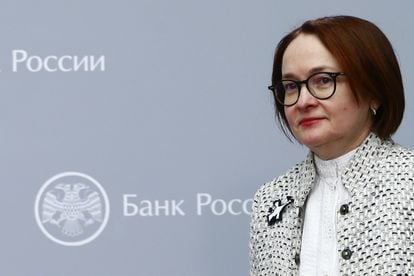Elvira Nabiúllina, president of the Russian Central Bank, in February 2020. Sefa Karacan (Getty Images)
The Russian economy has made it through the first blow caused by the sanctions imposed by the war in Ukraine, according to the president of the Russian Central Bank, Elvira Nabiullina.
But she warned representatives at the Duma this Monday that the country's reserves are near their end, and the real crisis will hit between the second and third quarters this year.
Hours after Nabiullina sounded the alert, Vladimir Putin himself rejected her warning from her.
“Russia has withstood unprecedented pressure.
The situation is stabilizing,” the head of state said in a press conference about the country's economic situation.
Nabullina emphasized that the economy is far from returning to normal.
“The period when the economy has been able to live on the reserves is over.
In the second trimester or at the beginning of the third, we will enter a phase of structural transformation”, said the economist, whose tenure leading the financial organism was set to end this year and was renewed for five years at Putin's decision.
In her opinion, sanctions “affected financial markets at first, but now they will start to affect sectors of the real economy more and more”.
The head of the Russian Central Bank noted that the problem is not the financial system, but the lack of materials that factories and companies will receive in the near future.
“The main problems are not with the sanctions on financial institutions, but with restrictions on imports and, in the future, exports of Russian products,” she added.
Additionally, Russians will have to accept their loss of purchasing power.
For the time being, the Central Bank will not attempt to compensate for inflation.
“We will not attempt to reduce it in any way, because that would stop companies from adapting.
Restoring the supply of imported components is more difficult and expensive, and it will inevitably affect the price of the final product,” she explained.
Many companies find themselves scrambling to solve the problem.
Some airlines have announced that they will leave part of their fleet grounded and use the parts to repair other airplanes.
The telecommunications sector calculates that its stock of replacement parts will last until the summer before system failures will begin.
The year-on-year inflation rate reached 20% in March, the first month of the war, and many companies have suspended exports to Russia until the ruble's value stabilizes.
Before the war, Russian authorities estimated that 80% of critical sectors had replaced imported goods for nationally produced products.
Nabiullina also played down the country's holdings in foreign currencies.
Half of the fund of 620 billion dollars (592 billion euros) was frozen by the west, and the rest has been used to protect the ruble.
According to the bank, it is not enough.
“It consists of gold and yuan, which does not allow us to manage our currency in the eternal market,” she emphasized.
Hypothetical buyers of the precious metal would face sanctions, and because of Beijing's controls, the Chinese currency has less liquidity in the international market than that of the US or Europe.
Nabiullina's pessimism contrasts with the victorious declarations that Putin gave shortly afterwards.
“We can say with confidence that the policies against Russia have failed, and the economic blitzkrieg has not succeeded,” he said.
The leader declared that the West “tried to quickly break the economy and provoke panic in the stock exchanges, collapse the financial system and provoke a major shortage of products in supermarkets.”
According to his version of him, the central bank's initiative helped the country avoid that fate.
“The ruble's exchange rate has returned to its levels from early February,” he said, before insisting that foreign currencies “are returning to the country's banking system and individual deposits are growing.”
When the sanctions began, a few days after the war started, the Russian government and the agency led by Nabiullina imposed a limit on capital movement and increased interest rates from 9.5% to 20%.
Among other restrictions, it forced companies to exchange 80% of their holdings in dollars and euros for rubles, prohibited banks and exchange houses from selling those currencies to civilians and banned foreigners from diving from stocks in the Moscow Exchange.
The central bank now faces the delicate task of ending those measures and returning to a market economy.
The exchange rate of the Russian currency, which has previously reached 160 rubles per euro, closed this Monday at 83, after the organism allowed banks to sell the few dollars and euros that they had received since April 9.




